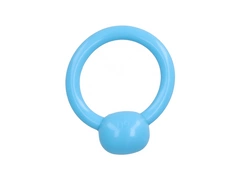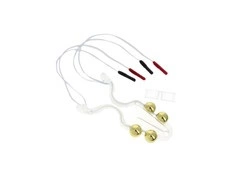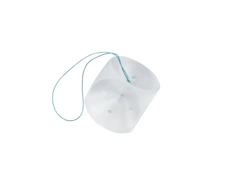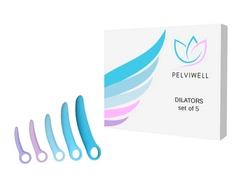Easy return of products
This product is available in our stores
Thick ring pessary Dr. Arabin

Thick ring pessary Dr. Arabin - description:
A thick ring pessary is a specialized medical device used in gynecology. Its basic task is to support the pelvic organs, especially when the uterus or bladder is lowered. This pessary is thicker than standard ring pessaries, which provides additional support and stability, and therefore, due to the larger contact surface, less pressure on the vaginal wall. It is worth noting that the words "thick" and "wide" are used interchangeably. Its purpose is to distinguish it from a standard (impliedly thin) pessary. A wide ring pessary is usually used in older people.
It is made of flexible, certified medical silicone. Its shape resembles a ring, which makes it easier to place it in the vagina. The thickness of the pessary is crucial because it allows for better support of lowered organs and reduction of symptoms associated with them.
The use of thick ring pessaries is the lowering or prolapse of organs (e.g. uterine prolapse) in minor degrees and stress urinary incontinence.
For many women, a thick ring pessary is an alternative to surgery, especially in cases where surgery is not indicated or is impossible to perform. This solution is particularly important for older patients who are at higher risk of surgical complications.
This pessary is available in various sizes, which allows you to choose the most suitable one for your specific case. It requires regular inspection and replacement by a specialist to avoid the risk of infection or irritation.
Its application and removal are usually simple, but it is recommended that the first pessary placement be done under medical supervision. With appropriate training, many women are able to manage their pessary on their own.
The thick ring pessary, although an effective solution for many gynecological problems, is not suitable for every patient. Therefore, it is important that the decision to use it is preceded by a thorough diagnosis and consultation with a gynecologist. The Dr. Arabin wide ring pessary is a medical device.

Characteristic features of a thick ring pessary:
- It is used for organ reduction in stage I or II,
- It is usually used in older patients with mild vaginal wall depressions,
- Used in the symptoms of stress urinary incontinence,
- This is reusable medical equipment, it should be used for a maximum of 3 years,
- If cracks or discoloration occur, the pessary should be replaced with a new one,
- If any undesirable biological effects occur, e.g. vaginal discharge, bleeding, unpleasant odor, always consult a doctor.
Thick ring pessaries - how to choose the size?
The ring pessary is used to lower the uterus and, technically speaking, the reproductive organs. After the first insertion of the pessary, the patient should be examined after a week (at the latest after four weeks). At each follow-up visit, the pessary is removed and cleaned, and the vagina is examined for erosions, pressure necrosis, or allergic reactions. It is not uncommon for the pessary size to change after the first adjustment. The patient should then be tested again within one to two weeks. If cracks or other defects are found on the pessary, it should be replaced. It is best for the patient to be under the care of the same doctor throughout the entire treatment period. For a motivated patient who can demonstrate successful removal, insertion and care of the pessary, follow-up visits may be at longer intervals at the physician's discretion.
Can I remove the wide ring pessary myself?
Yes, there are no contraindications to inserting and removing a wide (thick) ring pessary yourself. It is best to take it out in a standing position with one leg resting on a bed or a chair. When removing the ring, the patient pulls the ring with her index finger and slides it out of the vagina. It is advisable to remove the pessary at night and reinsert it in the morning.
When should a patient not use thick ring pessaries?
- Depression of organs of degree III-IV. Degrees that can be treated with cube or mushroom pessaries,
- For patients who require care or are unable to provide regular shifts, it may be advisable to involve a caregiver or family member in shift management.
- Pain, bleeding or heavy discharge, consult your doctor
- silicone allergy,
- Active infections, including vaginitis or pelvic inflammatory disease, prevent the use of a pessary until the infection subsides,
- Debilitated patients who do not understand, ignore, or cannot control advice should not have a pessary placed.
Contents of the package:
- Ring pessary Dr. Arabin size 55 mm,
- User manual
NOTE: After unpacking the product, it is not possible to return it.



















